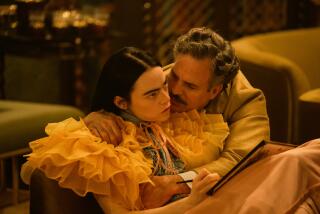Inside a dictator’s head
- Share via
FOREST WHITAKER digs deep to find the human in the inhuman. Whether he’s playing a killer for hire in 1991’s “Diary of a Hitman” or a home invasion robber in 2002’s “Panic Room,” Whitaker’s outlaws still manage to win some sympathy from audiences.
“I really try to search for what each character thinks and feels and, as a result, people start to understand them,” said Whitaker, a beefy vegetarian who ordered a plate of scrambled eggs and toast during a recent midmorning interview at the Four Seasons Hotel in Beverly Hills. “Even in ‘Panic Room,’ where my character puts gas into a room with a mother and a diabetic child, and where he even shoots a man in the head, at the end, still people like him.”
But when it came to humanizing former Ugandan dictator Idi Amin in “The Last King of Scotland,” set for release Sept. 27, Whitaker had the challenge of his long Hollywood career as an actor, producer and director, which spans scores of television shows and films.
The new film, based on the 1998 Giles Foden novel, centers on the intense relationship between Amin and a young Scottish doctor who originally set out for Africa in search of adventure. A chance encounter soon bonds the two, prompting Amin to appoint the white man played by James McAvoy as his personal physician, thus casting the newcomer into the strongman’s inner circle.
Initially, the Scotsman is enamored of Amin’s many charms, but he gradually discovers the horrors unfolding under the regime -- and his complicity in it. The film, which largely faults the British for Amin’s rise, is meant as an indictment of colonialism but also an examination of personal responsibility.
McAvoy’s character “was seduced by Amin’s power, but many people would have been,” said Whitaker. “The question becomes, when do you step in? He finally does step in, but he does it too late. And by then, he can only hope to save his own life.”
For Whitaker, a soft-spoken and introspective 45-year-old father of four, the work became how to transform a notorious, paranoid tyrant, blamed for the deaths of more than 300,000 of his countrymen, into anything more than a one-dimensional monster.
“I didn’t know much about Amin before I took the role,” said Whitaker. “I just knew the propaganda image of him as this beast of a dictator. But I took the role because I wanted to explore something about this man -- an opportunity to look inside the core of why he became who he was.”
The task meant several months of intensive research. Whitaker buried himself in archival footage and historical texts about Amin, who died in 2003. Whitaker found one tape especially revealing. “At one point, Amin tells his Cabinet, ‘If you see a traitor or spy, just kill them. Don’t ask me. Just kill him and call me later. I’ll be happy,’ ” recalled Whitaker.
Whitaker learned to speak Swahili and play the accordion just as Amin did -- interjecting both newly found talents into the film. His journey into Amin also led to the actor’s first visit to Africa, a trip made all the more poignant by his recent genealogical discovery of his family roots in Nigeria and other parts of western Africa.
Once there, he interviewed many of the former dictator’s relatives, friends and colleagues.
“Amin’s family wanted to know if I was out to destroy the image of Idi Amin,” said Whitaker, who met with the Ugandan leader’s younger brother and sister. “I know that to Westerners that sounds crazy, but that was their chief concern.
“I told them I wanted to play the character in an honest way. I told them I really wanted to know the truth or I wouldn’t have flown here to meet with you when everybody told me not to.”
The hard work is compellingly evident in Whitaker’s larger-than-life performance of Amin, in which he exudes both the charm and charisma of the leader but also his remorseless brutality and lethal unpredictability. Unlike most of his other films, Whitaker said he remained largely in character during the three months of shooting in Uganda and Britain.
“It wasn’t like I was mean to people,” said Whitaker, “but I kept the accent and the behaviors that I could.”
At his core, Amin was a soldier, Whitaker said, and may not have been as ambitious as history paints him. “For Amin, being a soldier was everything,” he said. “It was his way out of poverty, and it continued to be one of the most important things he ever did. He wanted to be a general but not president.”
“He’s paranoid, yes, but he often reacts just as a soldier would. Destroy my enemies, destroy the people who are trying to destroy me.”
Whitaker’s promotional rounds for “The Last King of Scotland” follow the completion of his next film, “Vantage Point,” due out next year. Whitaker stars along with Dennis Quaid and William Hurt in the Rashomon-style narrative about an attempted assassination on a U.S. president.
The dramatic thriller is mostly the same 15 minutes of action told from five viewpoints. In it, Whitaker plays a tourist who makes a Zapruder-like tape of the shooting.
“He’s a guy that has had it rough, a recent divorce, and he’s on his way down,” said Whitaker. “And then he catches this moment on tape and suddenly he’s somebody.”
A somebody that audiences are sure to care about.
Before he leaves the restaurant, a family of European tourists at the next table stops him: “Are you the man from ‘Panic Room?’ asked a teenage girl.
“Yes,” Whitaker said, smiling.
“Can we take your picture?”
“Sure,” said the actor, standing beside the girl and two other teenagers as a parent shot the picture. “Sure thing.”
*
More to Read
Only good movies
Get the Indie Focus newsletter, Mark Olsen's weekly guide to the world of cinema.
You may occasionally receive promotional content from the Los Angeles Times.







